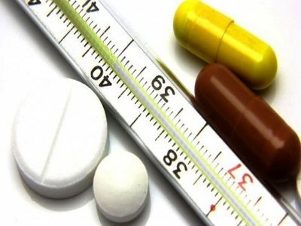The prostatitis is the inflammation of the prostate gland (prostate). A gland located under the bladder, the urethra Opatija. And at the slightest inflammation, the prostate begins to grow, thereby peredelyvala urinary channels. As a consequence there are problems with going to the bathroom and severe pain. Very often, prostatitis is manifested in men after the age of 30-35. Approximately 80% of older men to some extent suffer from the disease. Also, now 30% of young guy 20 to 30 are affected by this ailment. In this article we describe in detail how to correctly identify the first symptoms of prostatitis, how to accurately diagnose the disease and what to do in the first place, after confirmation of the diagnosis.

Signs of prostatitis
What is prostatitis? Usually doctors distinguish 6 signs heralding the prostatitis. If the man noticed at least 2 signs from the list, then he should definitely go to the doctor:
- Weak stream of urine falling down with a small range;
- A conflicted moments when urinating;
- Painful symptoms in the process of urination;
- The duration of urination, urine spray, an intermittent jet;
- Partial emptying of the bladder;
- Frequent urination, especially at night.
The doctor will always be able to identify the first signs of prostatitis in men, and treatment after diagnosis will be conducted in a timely manner, with a positive result.
Causes of pathology
Experts say that the reasons for the formation of the disease:
- The weakening of the immune system – decrease barriers that prevent many viral infections;
- Infectious processes viral elements, germs, bacteria through the blood or lymphatic ways into the prostate. A symptom of this phenomenon – the temperature when the prostate increases;
- Sedentary lifestyle – causes disruptions in blood circulation, oxygen starvation;
- Disruptions in the circulation as a result of stagnant moments in the genital area – caused due to sexual life, long abstinence from sex, irregular sexual sexual relations.
Inflammation in the prostate may start due to the penetration of germs, but for the development of the infection need a pathogenic microflora which may be created due to the following factors – the presence of harmful addictions, constipation, hormonal disruptions, injuries, hypothermia and so on.
The main causes of prostatitis in men include:
- Hormonal disorders — there is a theory that increased production of testosterone.
- Adverse impact on the prostate tissue, causing growth and inflammation. No less dangerous is a hormone that relaxes the urinary function.
- Immune status — when the body works "at the limit", he reduced the protective functions. He is not able to resist bacteria and viruses, which penetrate into it from outside or can not cope with the relapse of chronic processes.
- Passive sexual life is a male, having irregular intimate relationship is suffering from a stagnation of that lead to inflammation.
- Incorrectly chosen tactics of sexual contact — it's no secret that many couples as a contraceptive method practiced coitus interruptus. They do not represent that thus, impede the full flow of sperm. In addition, as a result, the PAP is violated, the mechanism of the outflow and blood actively flows to the pelvic organs and helps maintain a full erection.
- Sedentary men leads to stagnation.
- Urethral reflux — occurs against a background of bacterial lesions of the urethra. In violation of the mechanism of the reverse flow of urine, part of it gets in the way of the seed happens the bacterial infection of the prostate.
- Violation of the diet — if the diet there is junk food, with a predominance of animal fat and lack of protein and fiber, it affects the hormonal balance and proper intestinal function.
- Excessive exercise, especially with the use of steroid drugs.
- Hypothermia — leads to decreased immunity and development of pathogenic flora.
- Promiscuous — increases the risk of sexually transmitted diseases. Sexually transmitted infection in men often occur hidden, while hitting the prostate tissue. According to research, 78% of cases the cause inflammation either directly or indirectly are Trichomonas, chlamydia, gardenella, gonorrhea.

The prostate has its own defense mechanism: it produces a secret, which has antibacterial properties. But in the presence of aggressive pathogenic factors can not cope with the load and inflamed. Men of active reproductive age (18-50 years old) are most common with acute prostatitis. In middle age the main causes of prostatitis become sedentary, hypothermia and irregular sex life. It was during this period of acute process, the symptoms of which I did not pay attention, did not start timely treatment, has the potential to become chronic. For the male population over the age of 50 years characterized by three pathological process of the prostate:chronic prostatitis, adenoma, adenocarcinoma. In this case, surgical treatment in combination with hormone therapy and other methods.
Symptoms of pathology
What is prostatitis? Important symptoms that indicate the occurrence of prostatitis – difficult process of urination, painful sensation at this point. Frequent urge to empty the bladder in small portions indicates the development of pathology. The initial stages of the pathology can be asymptomatic. The acute form of the disease much easier to identify the manifestation of the pathology of always sudden and dramatic. You have to consider occurrence of the disease mainly by the individual characteristics of every human body.
There are the following symptoms of inflammation of the prostate:
- Pain in the perineum;
- The process of defecation accompanied by painful attacks;
- Potency disorders;
- Frequent urination;
- General malaise;
- Feeling of fullness of the bladder;
- The secretory phenomena of the urethra in the process of defecation.
Pain attacks in the development of pathology
Pain in prostatitis in men is not characterized by a precise localization. In the absence of treatment process pain attacks increase, spread to other genitals. In advanced situations the acute phase of the disease, adenoma. Regular painful attacks lead to an uncomfortable lifestyle, to the development of neuroses in the male, affects the quality of life.
Usually pain occur at the following points:
- In the process of urination;
- During erection;
- During sexual intercourse;
- At the completion of intercourse;
- In the process of defecation;
- Due to long-term abstinence, or, conversely, promiscuous sexual relations;
- After exposure;
The lower back starts to hurt, when pathology is already outside the prostate gland. Pain attacks either blunt or sharp. Due to the neglect of the pathology of the painful sensations can last for a long time. Also pathology in the area of the prostate characterized by dull or sharp painful attacks in the groin, rarely in the foot.
Elimination of pain is possible with the following methods:

- Prostate massage;
- Phytotherapeutic treatment;
- Hormonal methods of curing pathology;
- A special diet to normalize the condition of the person;
- Antibacterial remedy for harmful elements;
- The use of blockers for oblegchenno effect when urinating.
Symptoms of acute prostatitis
- High temperature;
- Severe pain in the perineum, in the groin, above the pubic area;
- Pain when urinating;
- Poor overall health;
- Reduced potency etc.
In chronic prostatitis the clinical picture is more often erased. May show no symptoms at all. Therefore, in this case the decisive role is played by preventive examinations aimed at detection of incipient inflammation of the prostate.
The symptoms of chronic prostatitis
- Arising and quickly passing pain in the perineum, groin, above the pubic area;
- Decreased sex drive (libido);
- Changing the duration of sexual intercourse (in some cases of rapid ejaculation, in others a considerable elongation of sexual intercourse);
- The changing nature of sexual pleasure (the reduction of brightness of orgasm);
- The appearance of discharge from the urethra, especially in the morning (prostatorrhea).
Diagnostic measures
The doctor can detect the signs of prostatitis in men and its treatment will be timely appointed. For definitions of prostatitis should consult a urologist who will examine and prescribe other important diagnostics are:
- Medical examination to provide an overall clinical picture;
- The taking of urine;
- Samples for detection of STDs;
- The determination of the presence or absence of infection, a swab taken from the urethra;
- Analysis of the ejaculate;
- An ultrasound of the genital organs;
- Urography;
- A biopsy for suspected cancer phenomenon.

Methods of treating prostatitis
How to treat this pathology? After the diagnosis of the disease, the doctor determines treatment of disease, usually uses an integrated approach consisting of the following points:
- Antimicrobial therapeutic methods – specialist prescribes a course of treatment medications, namely, antibiotics to remove harmful trace elements, leading to prostatitis. They also lower the temperature;
- Physiological effects, for example by laser, ultrasonic waves, electromagnetic waves.
- Used folk methods of treatment – warm baths with herbs;
- Be massaged in the area of the prostate gland – it releases the duct from stagnation, increases blood flow to the genitals;
- Phytotherapy – the use of decoctions of the useful medicinal herbs, dietary Supplements helps to strengthen immune system, fights infection;
- Psychotherapeutic methods – because of prostatitis in men develop negative psychological problems, lost confidence, there are fears during sexual intercourse;
- Surgical treatments are used in advanced and severe stages of disease, for example, abscess of the prostate;
- Correction of the immune system – your doctor may prescribe intake of specific vitamins, minerals, micronutrients to strengthen the immune system of the patient;
- A balanced, proper diet for prostatitis, the rejection of alcohol, Smoking, fatty foods, limiting salt intake and also to drink more plain water at least 2 liters per day.
Complications
When late begun treatment of prostatitis can occur a number of complications, characterized by:
- obstruction of the bladder with acute urinary retention requiring surgical treatment method;
- transition of prostatitis from acute stage to chronic;
- the development of some forms of male infertility;
- recurrent cystitis;
- narrowing, scarring of the urethra;
- pyelonephritis, other kidney conditions;
- a prostate abscess requiring surgical intervention;
- sepsis, life-threatening patient (this most vulnerable patients with weak immune systems, diabetes, renal insufficiency).
It is important to know! Pathology may lead to cancer of the prostate (observed in 7% of men older than 50 years), which will seriously deteriorate a man's life, and even lead to death.
Because of what may appear on the disease
Prostatitis has several types of defined causes of the disease.
The main factors causing the occurrence of prostatitis, the following:

- Infection. The bacteria get into the prostate in different ways. Young men who have sex without contraception (condom), have a high risk of the disease due to the penetration of pathogenic microorganisms (chlamydia, Mycoplasma, etc.). In addition, the occurrence of prostatitis occurs as a consequence of some internal chronic diseases. Harmful bacteria reach the prostate with the flow of lymph or blood. Pathological microorganisms can also "go down" into the prostate via the urethra. Then the disease caused by ailments of the urinary system (urethritis, pyelonephritis) weakened immunity.
- Stagnant processes. They manifest in obesity, sedentary lifestyle, because the blood circulation in the pelvic organs is disturbed. To the prostate as a result, does not reach the required amount of oxygen and nutrients.
- Injury. Due to mechanical damage of the tissues and organs of the small pelvis (OMT) can cause congestion, triggering an inflammatory process. Frequently, the truckers due to their professional activities related to long-term sedentary position and permanent injuries to a chair, beating on the OMT.
The opinion of doctors. Urologists believe that prostatitis is not a life diagnosis. If the treatment did not produce a quick result, that a man should not give up and wonder, did he brand all the requirements. Only with joint actions and efforts of the doctor and the patient, confident in the success of therapy will help the man to feel healthy, and so full.




































